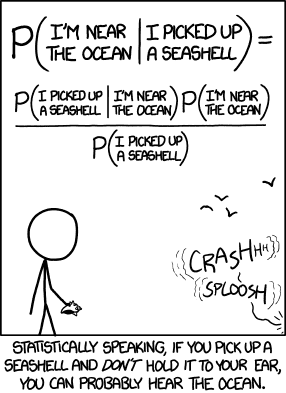
The Economics of Humor
Read a summary or generate practice questions using the INOMICS AI tool
This April 1st, we figured we’d spare you another bogus announcement or unfortunate attempt at a corporate joke and instead delve into the murky place where economics and humor intersect. If all you’re hoping for is a few economist jokes, (like the classic “Three Economists Go Hunting” jab we highlighted in a previous entry), then don’t worry, you’ll find some of those at the end of the post.
But first, we wanted to highlight a few people bold enough to knowingly connect economics and comedy on a regular basis. Yoram Bauman, who earned his PhD in economics at the University of Washington, is the only person out there (as far as we could tell) who works as a Stand-Up Economist. He used to be featured on Comedy Central and can now be seen on the PBS NewsHour in the United States, and he also tours the country spouting economics-related humor on college campuses, in high school auditoriums and on the occasional military base. He uses stand-up comedy to push for issues like education reform and a carbon tax, the latter being something he was part of creating and promoting in British Columbia, Canada.
Bauman got into the comedy world in 2003 after publishing a parody of the “ten principles of economics” in a journal focused on science humor called the Annals of Improbable Research. This journal promotes “research that makes people laugh and then think,” which seems like a logical sequence for articles combining science and humor. Improbable Research also hosts live shows, a newspaper column and a blog, all of which cover diverse topics in the realm where science and comedy intersect.
Other economists who have expanded their careers into the lighter side of economics include Tim Harford, who goes by the moniker The Undercover Economist. Among his many accomplishments (radio host, weekly columnist, visiting fellow at Oxford), is the publication of a best-selling book also called The Undercover Economist, which delved into “familiar situations in unfamiliar ways.” This book, and much of Harford’s work, act as something of a British counterpart to the work of U.S. economist Steven D. Levitt, who co-authored the book Freakonomics, and now co-writes a blog and co-hosts a podcast, both of the same name. While not strictly related to humorous topics, the many endeavors of both Harford and Levitt push the boundaries of traditional economics to introduce the public to a world where any query can be answered with economic models and any economic model can be made interesting with timely real-world applications.
Now to move onto those jokes we promised. These are taken from a few sites purely dedicated to economics humor, namely JokEc, Economics Jokes and Ahajokes, respectively.
- Q: How has French Revolution affected world economic growth? A: Too early to say.
- Q: Why did God create economists? A: In order to make weather forecasters look good.
- A party of economists was climbing in the Alps. After several hours they became hopelessly lost. One of them studied the map for some time, turning it up and down, sighting on distant landmarks, consulting his compass, and finally the sun.Finally he said, ‘OK see that big mountain over there?”Yes’, answered the others eagerly.’Well, according to the map, we’re standing on top of it.’
Comic: xkcd
-
- Conference
- Posted 8 months ago
Call for Papers: International SOEP User Conference, July 4-5, 2024 in Berlin (Germany)
Between 4 Jul and 5 Jul in Berlin, Germany -
- Supplementary Course
- (Online)
- Posted 4 years ago
The History of Economic Thought
at University of Oxford in United Kingdom -
- Conference
- Posted 7 months ago
2nd world Conference on Data Science & Statistics (Data Science Week 2024)
Between 17 Jun and 19 Jun in Amsterdam, Netherlands












